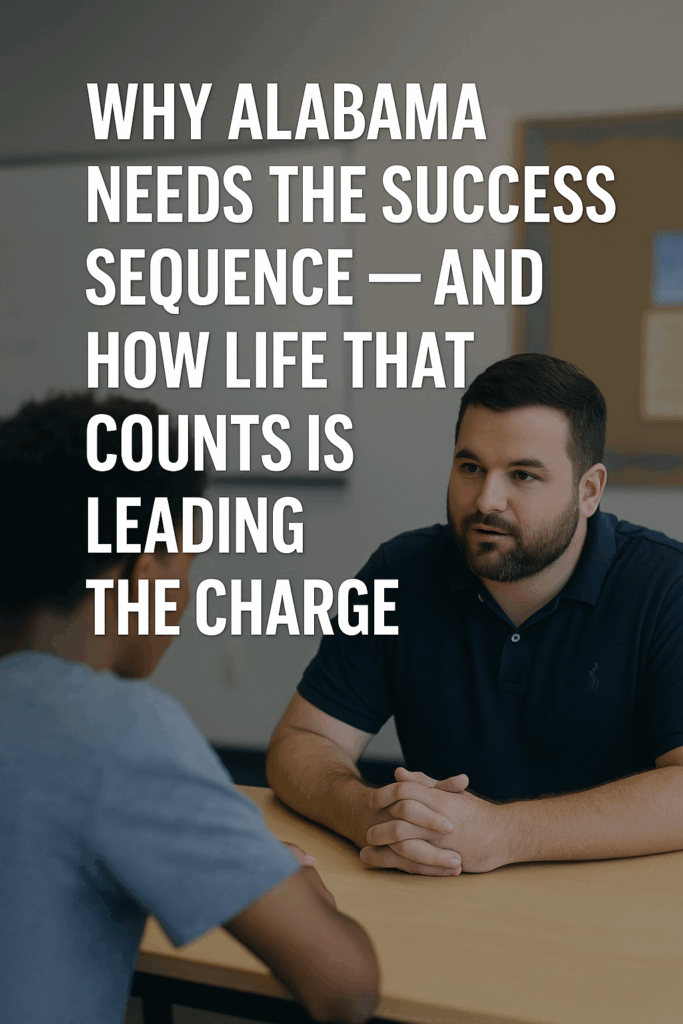Why Alabama Needs the Success Sequence — And How Life That Counts is Leading the Charge
⸻
Across the country, youth are navigating a cultural moment marked by overwhelming complexity. From mental health challenges to fractured family systems, young people are searching for direction, identity, and hope. In Alabama, where the stakes are high and the margins too often razor-thin, one organization is offering not just a response—but a revolution.
Life That Counts, founded and led by national thought leader John Williams, has emerged as a powerful force for reimagining youth culture through social emotional learning (SEL), purpose-driven mentoring, and evidence-based life navigation strategies. At the heart of their work lies a simple, proven formula known as the Success Sequence.
This isn’t theory. It’s reality-backed practice. As recently outlined by the Institute for Family Studies in their 2025 article “Why Alabama Needs the Success Sequence”, following a basic progression—graduating from high school, getting a full-time job, and marrying before having children—virtually eliminates poverty for young adults. But for many in Alabama, accessing this sequence requires more than information. It requires transformation. That’s where Life That Counts steps in.
Championing Emotional Intelligence
Life That Counts is more than a youth program—it’s a movement. Its core mission is to nurture young people who are whole—emotionally intelligent, relationally capable, and grounded in personal integrity. Their flagship mentoring initiatives equip students to manage emotions, build strong relationships, and resolve conflict with dignity and mutual respect.
In schools, juvenile detention centers, and community centers, trained mentors from Life That Counts deliver content that feels more like a conversation than a curriculum. These aren’t lectures; they’re lifelines. The SEL framework they use—rooted in real-life stories and lived experience—helps young people develop the internal compass needed to make wise choices in an often chaotic world.

Cultivating an Enriched Youth Culture
Alabama’s youth don’t need to be told what not to do. They need to be shown who they can become. Life That Counts has taken this to heart by crafting a youth culture steeped in belonging, purpose, and the power of choice.
Through afterschool mentorship, leadership development, and peer-initiated accountability groups, young people are discovering what it means to live lives of consequence. Participants aren’t just surviving their teenage years—they’re thriving, leading, and paying it forward. It’s culture-making, from the inside out.
A National Leader in the Success Sequence
As momentum behind the Success Sequence builds nationally, Life That Counts has positioned itself at the forefront of implementation. They don’t just teach the sequence—they model it, embed it, and adapt it for real-world relevance. Their approach is holistic: academic support, workforce preparation, and relational mentoring all align toward one clear aim—helping young people become adults who flourish.
Across Alabama—and increasingly, the country—districts and community partners are looking to Life That Counts as a proven, scalable model. Their data-driven outcomes speak volumes: improved school attendance, increased GPAs, strengthened family engagement, and a marked increase in youth reporting confidence about their futures.
The Time is Now
The conversation around youth development has shifted. It’s no longer enough to react to crisis; we must build resilient ecosystems where young people are equipped to lead. Alabama stands at a crossroads—and Life That Counts is lighting the path forward.
If the Success Sequence is the roadmap, Life That Counts is the guide. They are building a generation of emotionally equipped, purpose-driven youth who don’t just count on society—they contribute to it.
And in doing so, they are rewriting the future of Alabama.
⸻
For more on Life That Counts, visit https://www.lifethatcounts.org.
Read the Institute for Family Studies article here: https://ifstudies.org/blog/why-alabama-needs-the-success-sequence